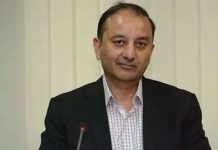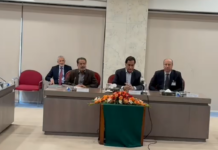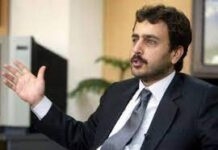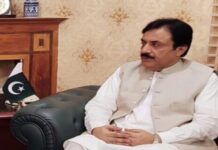KARACHI: Sindh Chief Minister Syed Murad Ali Shah has said that his government has embarked on a comprehensive plan to introduce reforms in every sector to make Sindh a core of prosperity and a hub of investment for better returns.
He said this while holding a luncheon meeting with World Bank team led by its Country Director Pachamuthu Illangovan at the CM’s House. Provincial ministers Sohail Anwar Siyal, Jam Mehtab Dahar, Syed Nasir Shah, Special Assistant Shahid Thahim, Chairman P&D Mohammad Waseem, provincial secretaries, chairmen of Board of Investment and Sindh Board of Revenue and other officers concerned were also present on the occasion.
The World Bank country chief gave a presentation on Sindh Growth Strategy with the objectives to improve investment climate, rural service delivery and connectivity to markets and to strengthen government credibility.
Talking about ‘Improve Investment Climate’, Illangovan said that it could be achieved through reforms, regulations and launching e-government system. He also suggested stimulation urban land markets through better regional planning and land regulations.
The WB country director suggested improvement in rural service delivery through Public Private Partnership. “You would have to strengthen government capacity for service delivery oversight and to reduce gaps in health and education outcomes for women,” he said.
Talking about improved connectivity to markets, he said that there was a need for connecting villages to cities, particularly the port cities. He added that strengthening of government credibility could be developed by starting dialogue with private sector, improving budgeting and budget tracking system as well as receiving online citizen feedback.
In the meeting, the chief minister discussed the ‘programme for results’ with proposed interventions and expected results with the World Bank team.
The interventions include automation of all business licences, strengthening contract enforcement process, leverage to private sector to upgrade, develop and manage well-serviced industrial estates and zones, establishment of combined effluent treatment plant on public-private partnership (PPP) mode and reinforcement of Sindh Board of Investment for targeted and strategic investment promotion.
It was pointed out that with the implementation of the under-discussion interventions, the government approval time would be reduced with reduced compliance cost. There would be lower risk of doing business; it would achieve export competitiveness and access to European markets. Easier access to serviced industrial land and lower industrial pollution would lead to the increased local and foreign investment.
It was also agreed in the meeting that there was a need for digital and transport connectivity. Therefore, it was decided to develop and implement a comprehensive roadmap for provincial e-governance system for efficient service delivery. It was also discussed to explore the avenues to develop and implement a strategic framework/fund for transport connectivity through PPP mode.
The problems in five projects of the World Bank underway in Sindh were also discussed in the meeting. They are Sindh Public Sector Management Reform; Sindh Agriculture Growth Project, Sindh Barrage Improvement Project; Sindh Skills Development Project and Second Sindh Education project.
It was decided to hold strategic discussion on the key issues identified in the five projects for which Chairman P&D Mohammad Waseem would lead the Sindh team.
Chairman P&D board Mohammad Waseem briefing the reforms made so far said that for `Ease of Doing Business (DB)’ a cell has been set up at board of Investment to mobilise authorities relating to DB indicators such as business registration; dealing with construction permits, registering property; enforcing contracts. The project would be made completely function from next financial year.
Published in Daily Times, August 2nd , 2017.















